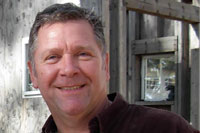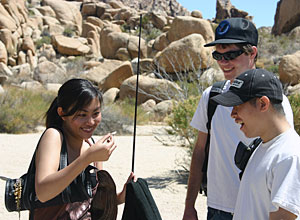« Prev Next »
 In today's podcast, Ilona speaks with Jefferey Kaufmann, a Professor of Biology in the School of Life Sciences and Technologies at Irvine Valley College. An outdoorsman at heart, Jeff has extensive experience with field research through his studies of the physiology, ecology, and evolution of reptiles. Along the way, he has discovered the unique value of field courses for biology students, which involve getting students out of the classroom and into a natural setting. Jeff has used his experience to help create the Bonita Creek Interactive Classroom project. Listen to this podcast to understand the advantages of teaching out in the field, and hear what Jeff has learned from decades of immersing students in nature for a rich learning experience. A full transcript of the podcast is below. [10:33]
In today's podcast, Ilona speaks with Jefferey Kaufmann, a Professor of Biology in the School of Life Sciences and Technologies at Irvine Valley College. An outdoorsman at heart, Jeff has extensive experience with field research through his studies of the physiology, ecology, and evolution of reptiles. Along the way, he has discovered the unique value of field courses for biology students, which involve getting students out of the classroom and into a natural setting. Jeff has used his experience to help create the Bonita Creek Interactive Classroom project. Listen to this podcast to understand the advantages of teaching out in the field, and hear what Jeff has learned from decades of immersing students in nature for a rich learning experience. A full transcript of the podcast is below. [10:33]
![]()


Full transcript
ILONA MIKO: Welcome to the latest edition of NatureEdCast by Nature Education. I'm Ilona Miko, and today we're talking to Jeff Kaufmann from Irvine Valley College about field courses in science education. Jeff is a Professor of Biology in Life Sciences and Technologies at Irvine Valley College in Southern California. He has extensive experience with field research through his studies of the physiology, ecology, and evolution of reptiles. Along the way, Jeff has become a proponent of field courses. He's been taking students out in the field for learning experiences since 1978. Welcome, Jeff, thanks for joining us.
JEFF KAUFMANN: Thanks for having me.
MIKO: So tell us what is a field course? And why is it important?
KAUFMANN: Well, the term field course can cover a lot of things. Generally what we think about as a field course in the college arena is a course that is taught mostly or entirely in the field which is a wild place. Some place where we would have the classroom environment, and we sort of have to rely on natural resources to pull off what we do. If that opportunity is out there, we tend to take advantage of it.
MIKO: So a field course would be something like taking a trip to a forest or a desert?
KAUFMANN: Absolutely, and it can involve a number of days as well. Sometimes we send these students out for up through two weeks in some locations. And some of that is required because it's such a distant site. And we have a group that I'm not part of, going off to Hawaii. But most of my trips are three day experiences, two nights. I've taken students out to the Southwest desert for five- or six-day experiences as well.
MIKO: What do they do out there?
KAUFMANN: What I do out there is, one way of utilizing that resource, I try not to be a talking head which sometimes we slip into, in which the natural environment, which you work so hard to get them out there to see, is nothing more than a backdrop. What I do is, I try to emphasize sort of a basic, fundamental tenet of exploration, which is this notion of discovery. I take students to places that they most likely would never go to. Maybe that road en route to Yosemite, or that road en route to the Canyonlands in southeast Utah, or that area, and drops them into an area which doesn't have a lot of the resources and things that are artificial. Or sometimes there isn't even a restroom out there. And we take them to places where they have a chance to see things that they would not otherwise see. And what I would like to emphasize is this notion of discovery. Once that van shuts off, and those doors open up, they're now out there in the field. And in a way, it's really like Charles Darwin who as a young twenty-something-year-old, on that Wednesday in 1835, landed on the Galapagos Islands. To him, that was brand new, and an area of great discovery. And for those students, for them as an individual, the experience can very much be the same thing.
MIKO: Because it's brand new?
KAUFMANN: Brand new for them. But the comment we usually get from students when we're out there is, "I had no idea; I had no idea this was out here."
MIKO: So why do you think the outdoors can be a good classroom for teaching in the life sciences in general?
KAUFMANN: Well, you're never going to see nature in its full glory until take them out there where nature is. We can take pieces of it into the classroom. We can sort of take it apart, and understand its underlying workings through a microscope or through an experiment. And I think that's incredibly valuable, and that's an important part of our program to actually take it to that classroom and sort of decipher things in a very scientifically structured way. I think it's also important, if it's feasible, to take them back out into the field again. And now let's see it implemented by nature. And now things such as those adaptations we talked about make more sense. Now the organism is alive and interacting with its environment. And I think that's a very important strategy if available to students. And really it comes down to really two things. One is the notion of pedagogy and this idea of learning by doing, or experiential learning, goes back thousands of years, back to Aristotle. And to this day it's firmly a central part of our modern pedagogic theory, is what students often times learn best. They usually best when they're actually doing something. But the other part of it, of course, is as a field biologist taking students in the field, I basically get to team teach with the wild place itself, that habitat, that desert dune, or that redwood forest, because in a way, that location becomes a co-teacher. If I just set the parameters, and tell them all the rules about how not to get something hurt and not to touch certain things because they could potentially be dangerous, I basically let them go out and explore. And they come back with many observations, many of the things that I myself may have not noticed there after going there for many years. That notion of discovery is what we learn as little kids, and I think it's still alive in a twenty-year-old. And in some cases, we have students that are in their 70s.
MIKO: So it's like a cultural immersion within nature?
KAUFMANN: Exactly. Again, like I said, it's logistically in organizing these trips can be a logistic nightmare. And that's something that I have to take on. But actually in some ways, because the easiest part of it is when you're actually out there because now the site becomes in part the teacher.
MIKO: How do you access what they've learned at the end? How can you assess how much they've absorbed?
KAUFMANN: Well, one thing they do is we always get back and we regroup. And they tell us about their discoveries, about what they've noticed, what patterns they've seen out there. One way we assess that in the field when you're there for a couple days is their ability to predict what's on the next side of that hill or what we can expect up that desert arroyo. And that gives them a kind of street sense about nature. And I think that goes back to basically the reason why humans ever learned and had to pick up on the nuances of nature in the beginning, which was about necessity. I mean that's the basic survival. And when we've learned about nature because it was what we had to do to make ends meet on a day-to-day basis thousands of years ago. And over the centuries, nature became more of a form of entertainment: first, for the wealthy, and then for everybody. And I think now we see in the twenty-first century, learning and understanding about nature is something now maybe of necessity.
MIKO: So we're going back to more of a survival mode, you think?
KAUFMANN: I think to some degree, but it's still very entertaining and there's a lot of good programs out there that I think are fascinating. But you'll never really get a full understanding of how that natural world works unless you have an opportunity to immerse yourself into it, even for a weekend. You know, make no mistakes about it, when you take students out in the field, like I said, there are logistic challenges, but the professor can actually take it easy in some ways, because the classroom consisting of walls and chairs is a lousy co-teacher. But a redwood forest is phenomenal. So you're basically off the hook as an instructor to some degree. You just have to guide them and pose the right kinds of questions, and listen to their discoveries.
MIKO: Do you think they pay more attention to you when you're in these natural settings?
KAUFMANN: I'll say one thing they do, and this goes back to when they're five-years-old, they want to impress you. They want to please you, which I think is fascinating. They want to tell you, even at twenty-five or fifty-five years-old, they want to share with you their discoveries about this particular chuckwalla lizard on a rock or this particular plant in bloom. I think it's fascinating. You don't see that kind of drive to communicate and to please the instructor to provide that kind of contribution to education in the classroom as much as you do out in the field. I think that's really fascinating. It reminds me about like with my sister. I have a sister who teaches five-year-olds in northern California. And she doesn't take them out the Mojave, but she has a little piece of, a little postage-stamp size of piece of ground out there. She's got some weeds and some plants growing, and she sends the kids out there all the time.
MIKO: And those are kindergartners, right?
KAUFMANN: Kindergartners, and you all these discoveries. When a kindergartener finds a pill bug, and you know the kindergartner, their world is a very self-centered world, understandably. They find a pill bug. That's the first pill bug ever found on planet Earth. And I understand that a 25-year-old doesn't quite see it that way. But in a way, for that person, that's the first desert iguana ever discovered under that bush. And for me, that's true too. So that kind of discovery, and that need to communicate, and to share, it's alive and well in some ways when you're a lot older than five-years-old.
MIKO: What's the role for technology in these types of field courses and field learning?
KAUFMANN: Well, it's interesting because in the classroom they can be a benefit. And now many faculty will probably now tell you, they become an annoyance. They became a distraction, so you had to tell students to shut down their laptops sometimes, or their cell phones. But what I think is fascinating is it gets back to sort of this understanding about what's the best way to experience nature- there it is, in your face. And I think this technology can actually be utilized in that way, and it has been over years. There's been lots of attempts to sort of give a real-life experience about what it's like to be in nature. But the interesting thing about the technology now, as it's going, particularly in communication, is the instantaneous nature of it. That you know exactly where your friend is, and what your friend is doing at that point in time. So basically in a way, you have a chance to experience that moment. This technology could and is being used more and more to give you that up-to-the-minute experience in nature as well. And so that you can actually have the most holistic, the most full-sensory stimulation you can, if you yourself cannot be there. I teach in southern California. Within three hours, I could be on the coast, I could be up in the 7,500-foot elevation in the Lodgepole pines, or I could be on the sand dune in the Mojave. A lot of structures don't have quite that access because of logistics, or funding, or just the geography of things. But I think this technology could actually bring a lot more about that natural world into the classroom regardless of where you teach.
MIKO: That's really interesting. Thanks for talking with us today about field courses, and what they can do to help life science learning in the modern college atmosphere. Thanks a lot, Jeff.
KAUFMANN: You're welcome.
MIKO: Thank you for listening to this edition of NatureEdCast. You can find this podcast and others at nature.com/scitable. That's nature.com/s-c-i-t-a-b-l-e. Please join us again next time.























